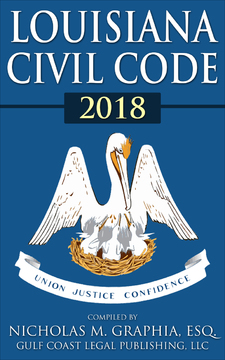 2017 Updates to the Louisiana Civil Code
2017 Updates to the Louisiana Civil Code
In 2017, the Louisiana Legislature made multiple changes to the Civil Code. In particular, articles 655, 656, 2350, 2369.3, 2375, and 3352 were amended. The amended articles are copied below.
These changes are incorporated in our 2018 edition of the Louisiana Civil Code. Copies are available here.
Art. 655. Natural drainage
An estate situated below is the servient estate and is bound to receive the surface waters that flow naturally from a dominant estate situated above unless an act of man has created the flow.
Acts 1977, No. 514, §1; Acts 2017, No. 105, §1, eff. June 12, 2017.
Art. 656. Obligations of the owners
The owner of the servient estate situated below may not do anything to prevent the flow of the water. The owner of the dominant estate situated above may not do anything to render the servitude more burdensome.
Acts 1977, No. 514, §1; Acts 2017, No. 105, §1, eff. June 12, 2017.
Art. 2350. Alienation of movable assets of business
The spouse who is the sole manager of a community enterprise has the exclusive right to alienate, encumber, or lease its movables unless the movables are issued in the name of the other spouse or the concurrence of the other spouse is required by law.
A community enterprise is a business that is not a juridical person.
Acts 1979, No. 709, §1; Acts 2017, No. 197, §1.
Art. 2369.3. Duty to preserve; standard of care
A spouse has a duty to preserve and to manage prudently former community property under his control in a manner consistent with the mode of use of that property immediately prior to termination of the community regime. He is answerable for any damage caused by his fault, default, or neglect.
Acts 1995, No. 433, §1; Acts 2017, No. 197, §1.
Art. 2375. Effect of judgment
A. Except as provided in Paragraph C of this Article, a judgment decreeing separation of property terminates the regime of community property retroactively to the day of the filing of the petition or motion therefor, without prejudice to rights validly acquired in the interim between filing of the petition or motion and rendition of judgment.
B. If a judgment has been rendered, in accordance with Article 2374(C) or (D), a reconciliation reestablishes the regime of community property between the spouses retroactively to the day of its termination, unless prior to the reconciliation the spouses execute a matrimonial agreement to the contrary. This agreement need not be approved by the court and is effective toward third persons when filed for registry in the manner provided by Article 2332. The reestablishment of the community is effective toward third persons when a notice thereof is filed for registry in the same manner.
C. If a judgment is rendered on the ground that the spouses were living separate and apart without having reconciled for at least thirty days from the date of, or prior to, the filing of the petition for divorce, the judgment shall be effective retroactively to the date the petition for divorce was filed, without prejudice to rights validly acquired in the interim.
Acts 1992, No. 295, §1; Acts 1993, No. 25, §1; Acts 1993, No. 627, §1; Acts 1997, No. 35, §1; Acts 2010, No. 603, §1, eff. June 25, 2010; Acts 2017, No. 197, §1.
Art. 3352. Recorded acts; required information
A. An instrument shall contain the following information when appropriate for its type and nature:
(1) The full name, domicile, and permanent mailing address of the parties.
(2) The marital status of all of the parties who are individuals, including the full name of the present spouse or a declaration that the party is unmarried.
(3) A declaration as to whether there has been a change in the marital status of any party who is a transferor of the immovable or interest or right since he acquired it, and if so, when and in what manner the change occurred.
(4) The municipal number or postal address of the property, if it has one.
(5) The last four digits of the social security number or the taxpayer identification number of the mortgagor, whichever is applicable.
(6) The notary’s identification number or the attorney’s bar roll number and the typed, printed, or stamped name of the notary and witnesses if the instrument is an authentic act of, or an authenticated act by, a notary.
B. The recorder shall not refuse to record an instrument because it does not contain the information required by this Article. The omission of that information does not impair the validity of an instrument or the effect given to its recordation.
C. The recorder shall display only the last four digits of the social security numbers or taxpayer identification numbers listed on instruments that his office makes available for viewing on the internet.
Acts 2005, No. 169, §1, eff. Jan. 1, 2006; Acts 2005, 1st Ex. Sess., No. 13, §1, eff. Nov. 29, 2005; Acts 2017, No. 173, §4.
NOTE: Acts 2005, 1st Ex. Sess., No. 13, §1, changed the effective date of Acts 2005, No. 169, to July 1, 2006.

